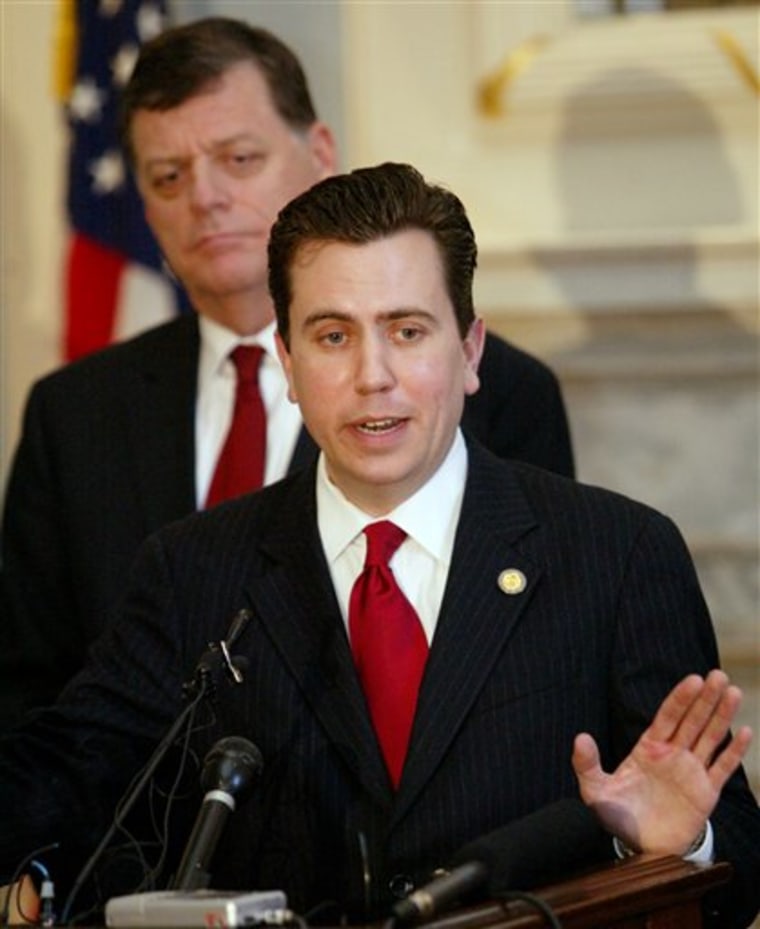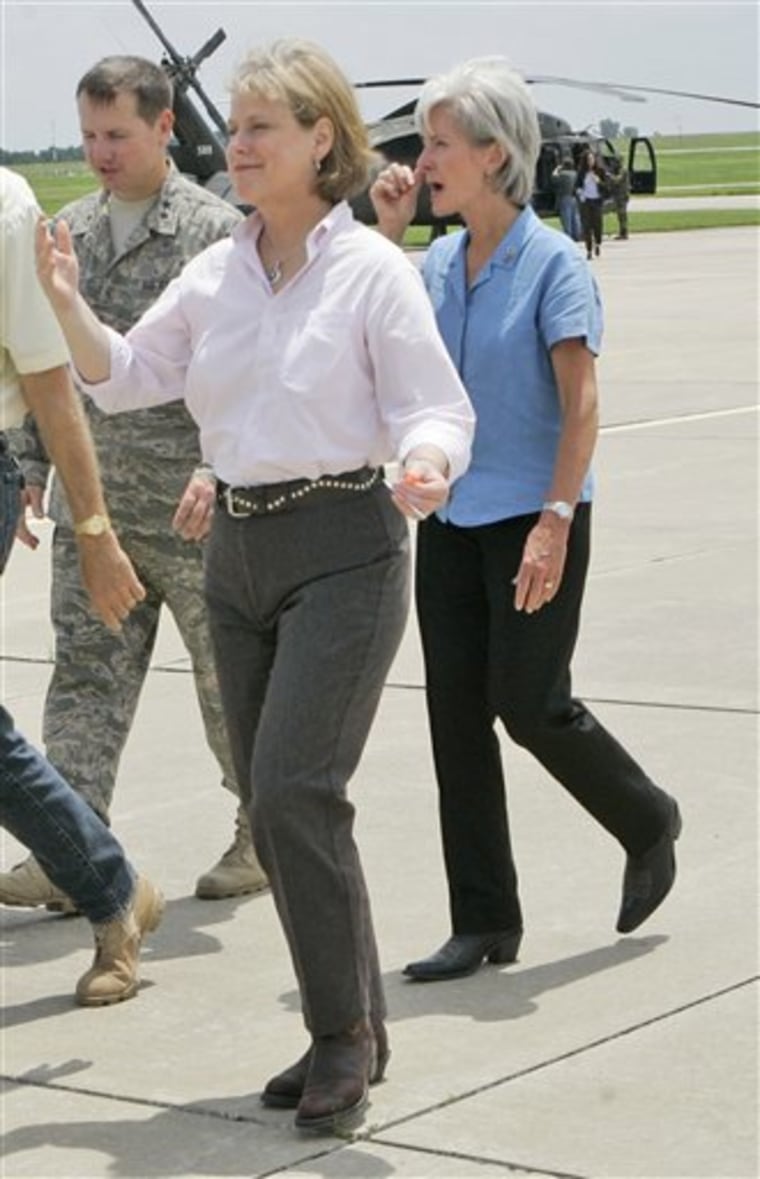Nothing personal, Sen. Obama, but our re-election comes first.
Barack Obama, for all his attention and primary successes, does not go over so well in a fair number of Democratic lawmakers' home districts. So it seems there is little chance that some will endorse him for president.
Some are counting on Republican votes in their re-election bids. Some are newly minted and in rematches with 2006 opponents. Some may be wary of how their constituents will react to a black presidential candidate. Some, too, have made it a practice of distancing themselves from the national party, fearing the inevitable campaign ad that has their face morphing into Howard Dean, the party chairman, and Obama.
Rep. Dan Boren, the only congressional Democrat in Oklahoma, calls Obama "the most liberal senator" in Congress and says he has no plans to make a public endorsement.
"We're much more conservative" in eastern Oklahoma, Boren said. "I've got to reflect my district."
Political necessity
Georgia Rep. Jim Marshall, a Democrat and Vietnam veteran who won his last election by about 1,800 votes, said he admires both Obama and Sen. John McCain, R-Ariz., but feels no obligation to state a preference.
"If it turns out one of them is an ax murderer or something like that I'll make a choice," he joked. Otherwise, "I don't think I need to get involved."
For most of these fence-sitters — at least 14 as of Wednesday — it boils down to political necessity: They are vulnerable Democrats in conservative-leaning districts who take pains to avoid aligning closely with the national party.
McCain has his own issues in his party. Many conservatives opposed the four-term senator, who has worked with Democrats and strayed from GOP orthodoxy on some issues, before he sealed the GOP nomination in February. Many still express reservations about him as the party leader.

Because McCain secured the party nomination much earlier in the campaign season, Republicans have not been pressed about their endorsements like Democrats have. But only a handful have publicly withheld their support for him. That includes Nebraska Sen. Chuck Hagel, who long has bucked the party hierarchy, and Rep. Ron Paul of Texas, who is running his own presidential campaign.
On the Democratic side, Boren said he, like most of the undecideds, will go along with nominating Obama at the Democratic convention in Denver in August.
Obama campaign spokeswoman Jen Psaki challenged Boren over his assessment of Obama and said the candidate had worked with Republicans in the Illinois Legislature and in Senate.
Asset in some districts, question mark in others
Obama, seeking to become the first black president, is hardly the first Democratic candidate to face such resistance. Over the years, moderates and conservatives have avoided associating with nominees going back to George McGovern in 1972 and including John Kerry in 2004. Public endorsements were not an issue in 2004 since Kerry had wrapped up the nomination early.
"They are all scared to death about getting beat by a Republican," said Sen. Claire McCaskill, D-Mo., one of Obama's most prominent supporters. "I don't think that if the good Lord himself had been nominated as a Democrat that some of those folks would have endorsed him. They are afraid of looking too much like a Democrat because of the kind of districts they're from."
As in the past, many uncommitted Democrats are from the South, which has favored Republicans in recent elections.
Although Obama swept the region in the Democratic primaries with near-universal support from black voters, he often fared poorly among working-class whites. As a result, he is seen as an asset in some districts but a question mark at best in others.
Rep. John Barrow, for example, represents a coastal Georgia district where blacks make up more than 40 percent of registered voters, mainly in urban areas around Savannah and Augusta. Not surprisingly, Barrow — who won his last election by fewer than 900 votes — endorsed Obama in February.
Converting holdouts
Marshall, the Democratic incumbent in a neighboring district in rural central Georgia, has stayed quiet.
Marshall's district is less than one-third black, and he needs the support of white Republicans to win, including votes from the military community around Robins Air Force Base. He faces a fresh challenge this year from a retired Air Force general.
Republican campaign strategists already have shown they want to link Democratic candidates with Obama and other national figures, such as House Speaker Nancy Pelosi, D-Calif., and the Rev. Jeremiah Wright, Obama's former pastor.
In special elections last month in Mississippi and Louisiana, Democratic candidates Travis Childers and Don Cazayoux faced television ads attempting to make those connections.
But Childers and Cazayoux won surprise victories, raising questions about the strategy's effectiveness.
Still, Childers is staying out of the presidential race, as is his fellow Mississippi Democrat Gene Taylor. Cazayoux recently announced he is backing Obama.
Obama's campaign has made some progress in converting the holdouts. Freshman Rep. Nancy Boyda of Kansas, who had insisted she would not budge from the undecided column, budged on Wednesday and endorsed Obama.
Boyda "has been impressed with Senator Obama's campaign because they're willing to take their discussion to all 50 states, rather than just the swing states," spokeswoman Liz Montano said.
Rep. Rahm Emanuel of Illinois, a Democratic House leader who helped orchestrate the party's strategy for winning control of Congress in 2006, argues against reading too much into the holdouts. He said most of them always stay out of national politics and that the party is generally unified around Obama.
"They're just going to stick to their knitting," he said. "It's not that they're anti-Obama."
